Seeds
Contents
Seeds are the very healthiest plant-based compounds, which are easily available, and nowadays, these seeds are very popular worldwide for their benefits.
Each seed is not the same as the other and has its own unique nutritional health benefits and they are a brilliant alternative to nuts.
So In this article, we will describe its benefits and some caution before adding it to your diet.
1. Chia Seeds
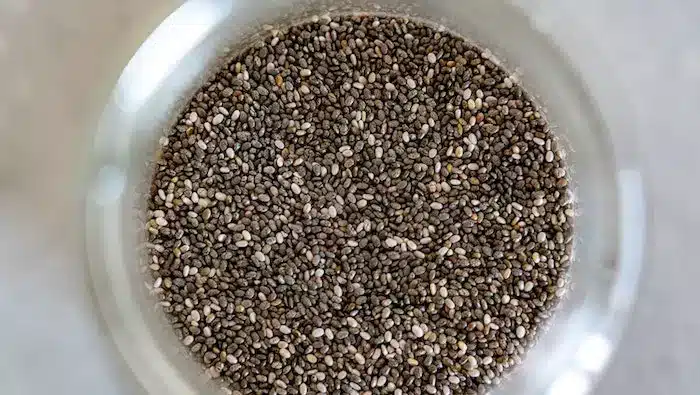
This seed is one of the healthiest plant-based food, which has many health benefits from top to our hair health, to our heart health.
Chia seeds are everyone’s favorite because they contain a rich amount of soluble fiber, and protein, which helps in losing excessive weight.
It contains, excellent amounts of fibre, omega-3, Minerals, protein, and tryptophan, which ensures, that your deep-quality sleep cannot be disturbed.
According to a few studies, omega-3 fatty acids shield the skin from UV rays, and also contain calming properties that can help prevent wrinkles.
A study published in 1999 by American Clinical Nutrition, which showed that fibre reduces bad cholesterol.
Contain a decent amount of fibre which can bring down cholesterol levels.
Recent studies also claimed that those who consume chia seeds in their diet have a more powerful immune system, than others.
Good for constipation treatment, because when we intake them, they absorb water, and convert into a gel-like form, which softens our stool to pass out.
Note 1: If you are a beginner, start with 1 tbsp of chia seeds, which lower the risk of bloating, gas, and inflammation, and gradually increase the amount.
Note 2: If you see any side effects, like rashes, inflammation, mouth ulcers, etc, then avoid them, or reduce the intake quantity.
2. Flax Seeds
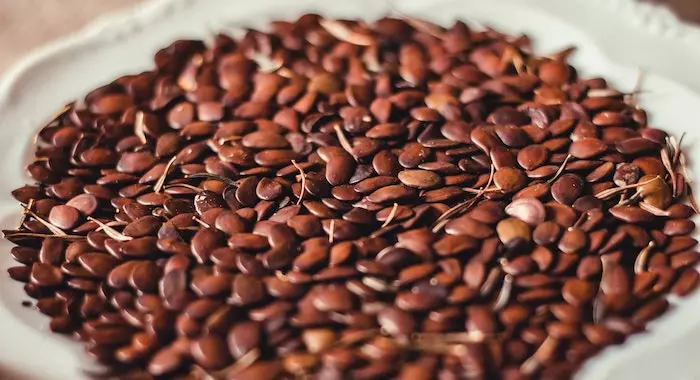
Recommended = 1 to 2 tablespoon
Flax seeds are also known as Alsi, Linseeds, Tissi, and many other names its is very popular for their health benefits.
Research also believes that it is one of the rich plant-based proteins, which contains omega-3 fatty acids even more than fish, and meat.
Flax seeds are loaded with antioxidants that contain lignans, which are unique fibre-related polyphenols that help in weight loss.
Research has pointed out that flax seeds contain “cancer prevent agents“, which reduced the risk of men getting prostate cancer.
Also rich in Omega-3 which helps to keep the skin saturated and smooth.
Additionally helps in keeping the skin tight and reduces the chance of dull skin with age.
Not 1, or 2, but 27 studies reported that eating ALA lowers the risk of heart disease by reducing cholesterol levels in the bloodstream.
Flax seeds oil is also a very reliable way to consume it, remember “never to heat its oil” because it contains fat, which changes due to heat, which can be toxic for you.
Note 1: Flax seeds should be “taken in the morning on an empty stomach” and their powder form is considered the best way to consume them.
Note 2: If you are a beginner, start it with a 1/2 to 1 tbsp and increase gradually, and its powder form is the best way to take all nutrients.
3. Hemp Seeds
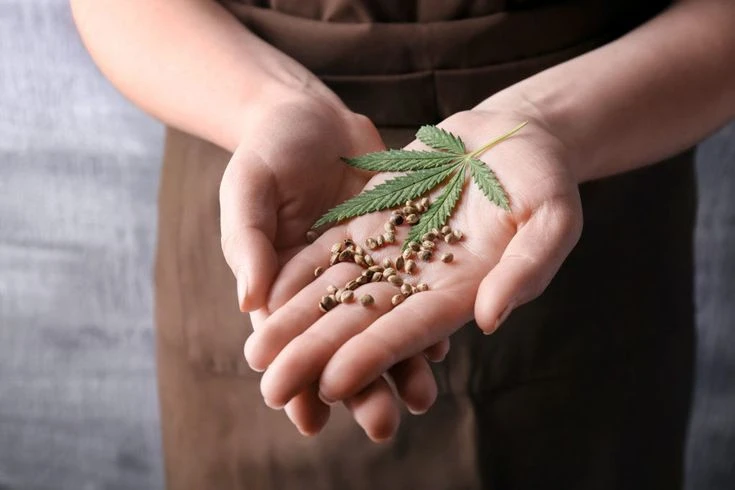
Hemp seeds mean – (भांग का बीज) In Hindi, which is very popular in Uttarakhand (India), it’s a big part of our foods as well as medicine.
2 tablespoon means – weight (20 gram) serving of hemp seeds contain:
- Calories: 111
- Protein: 6.31 grams
- Carbs: 1.73 gram
- Fat: 9.75 gram
- Iron: 1.59 milligram
- Zinc: 1.98 mg
- Calcium: 14 mg
- Magnesium: 140 mg
- Potassium: 240 mg
- Phosphorus: 330 mg
- Folate: 22 micrograms
Hemp seeds contain essential fatty acids (GLA) which help reduce the PMS and cramps, by relieving the sensitivity caused by that hormone.
They are considered a powerhouse containing about 35% of essential fatty acids and 33% plant protein, additionally have 9 essential amino acids.
This seed is also helpful in treating eczema as well as reducing acne by its anti-inflammatory properties.
Which also contain omega-3, and 6, which help to improve skin health by protecting our skin.
Eating hemp seeds can heal people who suffer from immune deficiency disease, which is caused by Tuberculosis.
Hemp seeds have neuroprotective properties that assist with preserving brain function and secure against neurodegeneration.
Also decreasing the risk of various neurological diseases like brain tumours, migraines, etc.
4. Pumpkin Seeds
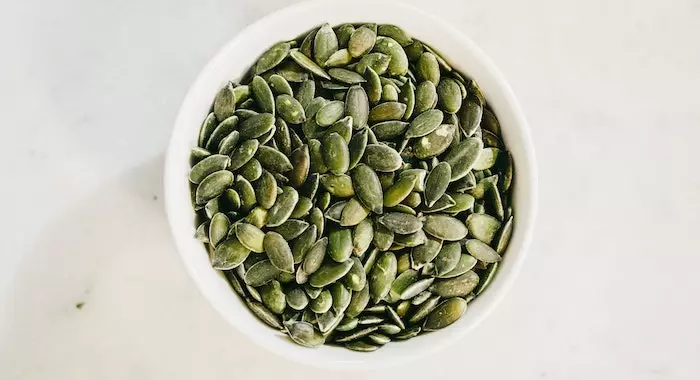
Pumpkin seeds are the only seeds producing alkaline in a world full of highly acidified diets.
It seeds have been reported to have many health benefits, because of their wide scope of nutrients.
100 grams serving of roasted pumpkin seeds contain:
- Calories: 536
- Protein: 32.14 g
- Carbohydrates: 4 g
- Fat: 42.86 g
- Sodium: 571 g
- Iron: 16.07 milligrams
- Calcium: 71 mg
These seeds are very effective in preventing very common prostate problems in which the gland enlarges. this causes problems while urinating.
One study was conducted with 1400 men, with enlarged prostates, for an entire year.
The result is surprising, their overall quality of life improved a lot.
Pumpkin seeds contain fatty acids, magnesium, and antioxidants which keep your heart healthy in the long term.
A study has found pumpkin seed oil is very useful in stimulating good cholesterol and decreasing blood pressure, these both promote heart health.
Some studies proved that they are very effective in decreasing blood sugar levels in people with type-II diabetes.
5. Sesame Seeds
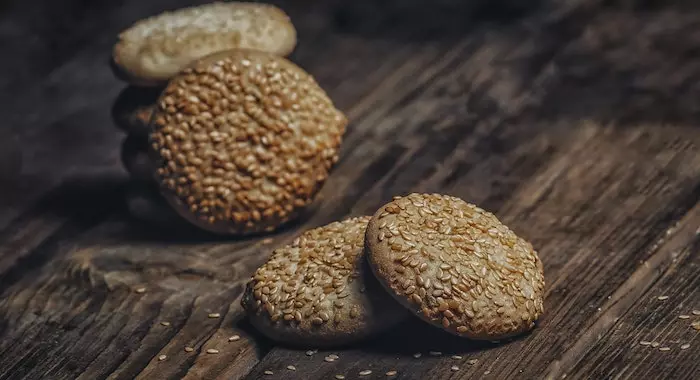
Sesame seeds are used thousands of years ago by Egyptians as medicines. they may protect against heart disease.
Sesame seeds are not only the source of manganese and copper, but they are also the best source:
- Calcium
- iron
- phosphorus
- vitamin B1
- zinc
- magnesium, and dietary fibre
100-gram dried sesame seeds serving to contain:
| Nutrients | Value |
| Calories | 573 |
| Carbs | 23.45 g |
| Protein | 17.73 g |
| Total fat | 48.01 g |
| Dietary fiber | 11.8 g |
| Zinc | 7.75 milligram |
| Sodium | 11 mg |
| Iron | 14.55 mg |
| Manganese | 2.400 mg |
| Copper | 4.080 mg |
| Magnesium | 350 mg |
| Potassium | 465 mg |
| Phosphorus | 627 mg |
| Calcium | 975 mg |
It is rich in many complex B vitamins like Folic acid, Thiamin, and Niacin which makes it very good for your skin, eyes, and hair health.
Sesame seeds are an incredible source of nutritious plant proteins. simple a 20-gram serving of sesame seeds gives you 5 grams of protein.
Pumpkin seeds are loaded with antioxidants that contribute to healthy T levels and improve overall health.
For people who are suffering from joint pain or low bone density.
Add sesame seeds 3 to 5 tablespoons to your diet for 2 months can reduce your bone medicine intake.
Hulled roasted sesame seeds are extraordinary because hulling and roasting eliminate compounds that meddle with the digestion and absorption of protein.
6. Sunflower Seeds
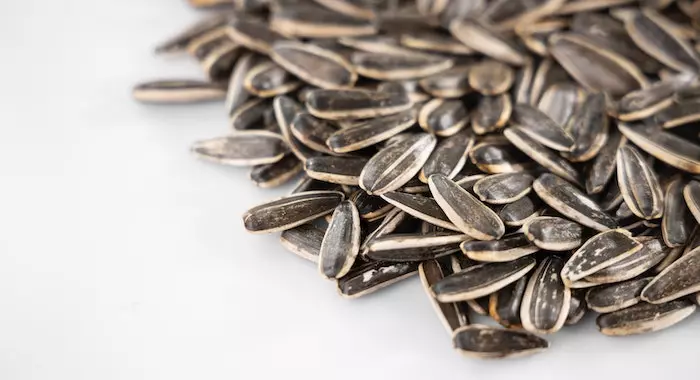
Sunflower seeds have the richest phytosterol substances of all seeds.
Phytosterols are compounds found in plants and have a substance structure basically similar to cholesterol.
30-gram shelled sunflower seeds, dry-roasted contain:
| Nutrients | Value |
| Total fat | 14 g |
| Protein | 5.5 g |
| Calories | 163 |
| Carbs | 6.5 g |
| Fiber | 3 g |
| Omega-6 | 6.6 g |
| Vitamin E | 37% of the RDI |
| Niacin | 10% of the RDI |
| Iron | 6% of the RDI |
| Magnesium | 9% of the RDI |
| Zinc | 10% of the RDI |
This seed has a property that makes your mood good, this property of sunflower seeds is due to the content of Tryptophan present in the seeds.
Tryptophan effectively increases your brain’s serotonin (reduces tension and makes you feel relaxed).
Sunflower seeds contain zinc which is known to activate around 250+ enzymes in the body, also includes selenium, and other vitamins, which can boost immunity.
Contribute to cardiovascular health by regulating the level of good cholesterol, and reducing the bad LDL, which is rich in good fats, both mono and polyunsaturated.
However, it’s suggested that sunflower seeds may reduce both good and bad cholesterol.
7. Caraway Seeds
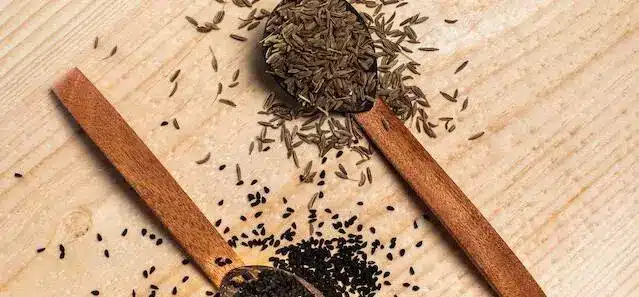
Caraway means – In Hindi (शाही जीरा), which has been used in ancient times as medicine. this traditional herb is still used by many Indians.
The best of the best properties of caraway seeds is that they are great potential to reduce chronic inflammation.
100 grams of caraway seeds contain:
- Calories: 333
- Protein: 19.77 g
- Fat: 14.59 g
- Carbohydrates: 50 g
- Dietary fibre: 38 g
This spice is a great source of minerals such as Copper, Calcium, Iron, selenium, manganese, zinc, potassium, and magnesium.
- Calcium: 689 milligram
- Copper: 0.910 mg
- Iron: 16.23 mg
- Magnesium: 258 mg
- Phosphorus: 568 mg
- Zinc: 5.5 mg
Caraway has additionally been effectively utilized in blending with peppermint oil in the treatment of (IBS).
Additionally, these seeds are rich in carvone, a chemical that is responsible for improving our intestinal health.
8. Pomegranate Seeds
Pomegranate has been used for thousands of years to treat a wide variety of diseases as part of many cultures including:
- Greek
- Buddhist
- Islamic
- Hebrew
These seasonal fruits contain natural antimicrobial from vitamin C which may help fight bacteria and fungus in our skin.
Due to the high substance of fibre, this power bank nutritious fruit has weight reduction properties.
Also boosting your digestion, these fruit seeds are an incredible wellspring of nutrients K and folic acid.
The amount of antioxidants in pomegranate is considered to be 3 times more than red wine and green tea.
You can get sufficient nutrition from just one pomegranate.
One medium-size pomegranate provides 233 calories, 4.7 g protein, 53 g carbohydrate, 665.6 mg potassium, and 9 mg sodium.
Down Line
Each seed is not the same as the other and has its own unique nutritional health benefits and they are a brilliant alternative to nuts.
Sunflower seeds have the richest phytosterol substances of all seeds.
Pumpkin seeds are loaded with antioxidants that contribute to healthy testosterone levels and improve overall health.



